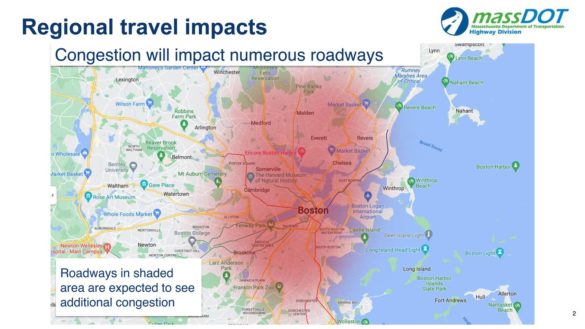I couldn’t help but laugh during this week’s press conference about the upcoming, month-long closure of the Orange Line. State officials shared a map of the area expected to see “severe congestion” on the roads, with Charlestown right at the center of the scary pink blob. “If possible,” added the state’s highway administrator, “avoid the region altogether until the diversion period has ended.”
So long, folks! I’ll see you in October!

“Avoiding the region” is something not so easily done for those of us who live or work or go to school or go to church within couple miles of the Orange Line or I-93. And in fact, it’s not so easily done in life in general.
There are times when we desperately want to avoid something, or someone, but we can’t. Some of the time, of course, it’s a matter of health or safety; the thing we are trying to avoid really is dangerous, and we really ought to try to avoid it, and to seek others’ help. Other times, it’s a matter of prejudice or phobia; we want to avoid something, but we’re actually better off if we encounter it, and find that we’re safe, and our anxiety or prejudice or phobia will diminish over time. And sometimes, it’s relatively easy to “avoid the region,” which I suppose is what the advice was really meant to suggest: if you live in the suburbs, this is not a good time to drive into the city to visit a museum or eat at a restaurant!
But most of the time, most unpleasant experiences are simply there to be endured. Whether twenty minutes of a particularly long and dreadful sermon, or an hour in the dentist’s chair for a particularly uncomfortable procedure, or a month without public transit and our streets full of irate commuters, some experiences simply cannot be avoided.
So what are we to do?
At times like this, it’s no surprise that the Serenity Prayer written by Reinhold Niebuhr in the 1930s is so popular. It circulates in various forms, but it’s always something like:
“God, give us grace to accept with serenity the things that cannot be changed, the courage to change the things that should be changed, and the wisdom to distinguish the one from the other.”
It’s sage advice for any situation. There are some things over which we simply have no control (the weather, the words that come out of another person’s mouth, the inner workings of the MBTA). But there are other things over which we have… not control, maybe, but at least some influence: our own words, our own actions, the focus of our own attention. And throughout our lives, in situations of frustration or anger, God invites us again and again to turn away from feeding the flames of our rage and set our minds on something else in prayer.
You may not be able to “avoid the region altogether,” whatever that congested region may be. But maybe, just maybe, you can take a moment to pray for the grace to accept what cannot be changed, the courage to change what can and should, and the wisdom to know the difference.
